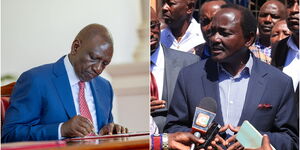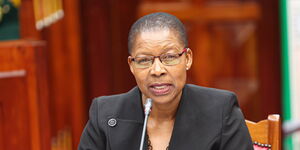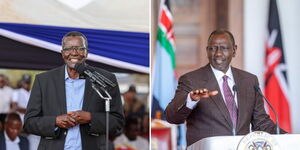The government is set to take more loans and cut down on tax collection in the financial year, Treasury Cabinet Secretary John Mbadi has revealed.
Through a gazette notice, the Treasury announced that Kenya is now targeting collections of Ksh2.4 trillion ($18.5 billion) for the fiscal year through June, three per cent below a revised target of Ksh2.475 trillion.
The decision was mainly informed by deadly Gen Z-led protests that arose from the 2024 Finance Bill that forced President William Ruto to drop the controversial tax plans on everything from bread to diapers.
“This economy was shut for two months. That affected revenue collection,” Mbadi explained to lawmakers in a past engagement this week.
The anti-Finance Bill protests, which morphed into anti-Ruto protests, reportedly left at least 60 casualties and many others reportedly abducted.
To that effect, Mbadi’s forecast for net domestic borrowing rose by 46 per cent to Ksh597.2 billion according to the notice. Foreign loans are now seen at Ksh718.4 billion, an increase of about a fifth (Ksh598.6 billion) from the first revised target.
However, the reforms put Kenya at a risky position, as a recent revelation by the International Monetary Fund (IMF) revealed that Kenya was at a high risk of debt distress. Debt distress refers to a situation where a country (or sometimes a company or individual) is struggling or unable to meet its debt obligations.
The country walked away from the final assessment of a four-year $3.6 billion (Ksh 466.1B) IMF program that ended this month, foregoing about $850 million (Ksh 110B) in financing, preferring instead to apply for a new one.
The move was justified by Prime Cabinet Secretary Musalia Mudavadi, who noted that a new deal would allow Ruto’s administration the opportunity to set its own agenda and targets.
“Some of the targets were extremely steep,” Mudavadi noted of the last programme. If you are unrealistic with some of your projections, you end up exerting a lot of pressure on your economy and your people,” he explained.
The PCS further added that talks over a new three-year deal would start soon and be concluded by November, but failed to reveal the deal’s specifics. He still noted that the deal would consider the current reality as well as the local and global economic climate.
“We have to come to terms and discuss these new realities as we negotiate the new programme,” Mudavadi said. “We would have to be very realistic based on the numbers that we have as a country to be able to project and show the kind of revenue targets that we want to work with going forward.”
It remains to be seen how these fiscal policies would align the government’s development agenda with other external factors, such as geopolitical tensions occasioned by United States President Donald Trump’s imposition of trade tariffs still linger.












